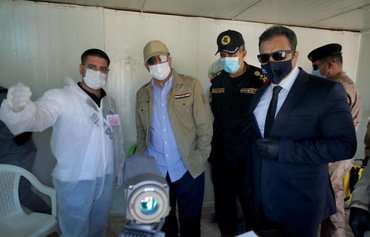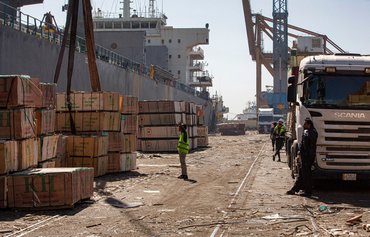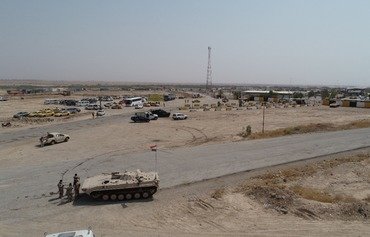The Iraqi government has been stepping up efforts to tighten controls at international border crossings to ensure imports and customs transactions are legally compliant and to stamp out smuggling and illicit commercial activity.
As part of these efforts, Iraqi border patrol and security forces operating at various crossings have been ordered to expand the scope of their reconnaissance activity.
In a July 25th directive, the Iraqi Supreme Judicial Council announced there would be "severe legal measures" taken against anyone who is caught taking part in cross-border smuggling operations.
Similar penalties will apply to non-governmental entities that interfere in the work of official state institutions at these crossings, the directive said.
![An Iraqi helicopter patrols al-Sheeb border crossing with Iran on January 1st, 2018. Iran-backed Iraqi militias have sought to dominate many crossings, especially those with Iran, in order to control imports and conduct smuggling operations. [Photo courtesy of the Rafidain Operations Command]](/cnmi_di/images/2019/08/14/19391-Iraq-Iran-border-600_384.jpg)
An Iraqi helicopter patrols al-Sheeb border crossing with Iran on January 1st, 2018. Iran-backed Iraqi militias have sought to dominate many crossings, especially those with Iran, in order to control imports and conduct smuggling operations. [Photo courtesy of the Rafidain Operations Command]
Yet armed militias continue to obstruct these regulatory measures, Iraqi analysts told Diyaruna, as revenues they can obtain through the border crossings serve as a key source of their income.
Diverting state revenues
Iraq has 21 land, sea and air border crossings which serve as entry points for imported goods, in addition to those in the Kurdish region.
These include the Umm Qasr port (south and north) and the Shalamsha and Mehran land crossings with Iran, the Safwan crossing with Kuwait and the Trebil crossing with Jordan, in addition to various airports.
According to political affairs researcher Abdul Qader al-Nayel, Iran-backed Iraqi militias have sought to dominate many crossings, especially those with Iran.
Armed groups such as the Badr Organisation, Harakat al-Nujaba, Asaib Ahl al-Haq and Kataib Hizbullah split among themselves most of the revenue they make from imposing tariffs on imported goods, he told Diyaruna.
"This revenue should go to the state, but it instead lines the pockets of militia leaders and influential corrupt individuals, which results in significant financial losses for the government," he said.
Just a small portion of the revenue that should by rights go to the Iraqi government actually makes it to the state coffers, as it is diverted by militias.
The militias are using their influence to commit fraud, such as by allowing illegal goods to enter the country or forging documents to misstate the quantity or quality of the imports, al-Nayel said.
This allows them to reduce customs fees for importers in return for pre-agreed commissions, he said.
Annual revenues the militias are making "could reach $11 billion if we take into consideration that these groups have opened unofficial border crossings with Iran over the past couple of years", al-Nayel said.
"Various goods are illegally brought into the country, passing under the radar of health and other regulatory bodies, not to mention narcotics and smuggling of livestock, scrap metal and oil," he said.
Tightening border controls
The entry of illegal goods into Iraq has a "damaging effect" on the Iraqi economy, strategy expert Alaa al-Nashou said, not to mention that this activity undermines the security and safety of Iraqis.
The government has tightened its import controls, particularly at the border in Basra, and there are steps in place to monitor irregularities, he told Diyaruna.
But the presence of Iran-backed militias in this area is notable, he added, pointing out that they have a "very strong influence" at the border.
"They are making huge amounts of money, not only through customs duties, but also from bribes they force people to pay at their own checkpoints on imported goods that come from border crossings and flow into the provinces," he said.
The militias also have established unofficial crossings at the Iraq-Iran border in Diyala and Wassit provinces, al-Nashou said.
In addition to enabling the flow of unregulated goods into Iraq, he said, these crossings also are being used as drug-smuggling routes.

![Iraqi trucks transport imported food from Umm Qasr Port in Basra province on August 6th. [Photo courtesy of the Iraqi Ministry of Transport]](/cnmi_di/images/2019/08/14/19390-Iraq-Basra-port-600_384.jpg)






